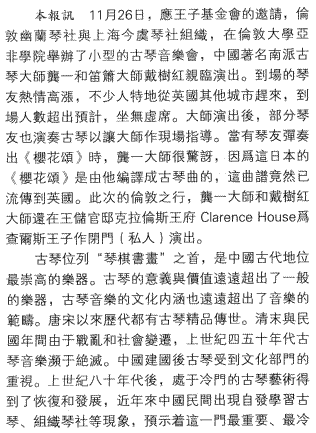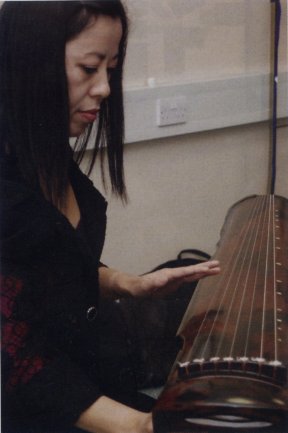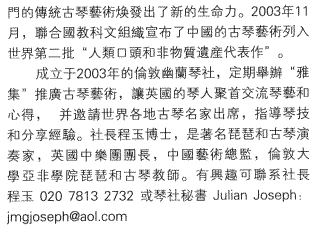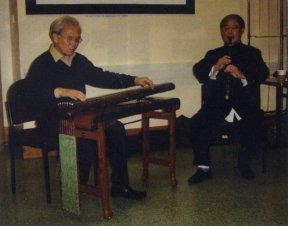Visit to London by Gong Yi and Dai Shuhong
On December 16th 2008, the EU Chinese Journal (新歐僑報) published the following article:
The entire page is available here as a pdf file (2.8 Mb).
English
Ancient Sounds Bequeathed From High Antiquity Come To the Royal Residence
Report by Ashley Guan
At the invitation of the Prince’s Charities Foundation, the London Youlan Qin Society and the Jinyu Qin Society in Shanghai, a small guqin concert was held at the School of Oriental and African Studies (SOAS), London University, on 26 November, at which China’s famous Southern School qin master Gong Yi and dizi and xiao flute master Dai Shuhong performed. The qin aficionados who attended were very enthusiastic, and a number of people came especially for the event from other cities in England; the number of attendees was greater than expected, and it was a full house. After the masters had performed, some of the qin aficionados also played, enabling the masters to provide on-the-spot guidance. One person played Sakura, Sakura. It was Gong Yi who had transcribed this Japanese melody for the guqin, and he was very surprised that the score had reached England. During their visit to London, masters Gong Yi and Dai Shuhong gave a private performance for Prince Charles at Clarence House.
The qin heads the list of the “Four Treasures of the Scholar's Studio” (qin, chess, calligraphy and painting), and in ancient China it had the highest status of any musical instrument. The significance and value of the guqin far, far surpassed that of ordinary musical instruments, and the cultural content of its music far, far surpassed the bounds of music. Fine qins have been handed down from the Tang, Song and later dynasties. Because of the chaos caused by war and social vicissitudes at the end of the Qing dynasty and during the years of the Republic, guqin music was brought to the verge of extinction, but after the establishment of the People’s Republic of China, it came to the notice of the Ministry of Culture. After the 1980s, the art of the guqin, which hitherto had received little attention, was reinstated and developed; in recent years people in China have begun to study the guqin and form guqin societies, giving this important but neglected traditional art a new lease of life. In November 2003, the Educational Department of the United Nations Educational, Cultural and Scientific Organization (UNESCO) included China’s art of guqin music in the second proclamation of the “Oral and Intangible Heritage of Humanity”.
The London Youlan Qin Society, founded in 2003, holds regular “yajis”, to promulgate the art of the guqin, enabling England’s qin aficionados to meet and exchange qin artistry and knowledge, share experiences, and invite qin experts from all parts of the world. The president of the society, Dr Cheng Yu, is a well-known pipa and guqin player, leader of the UK Chinese Music Ensemble, general manager of China Arts, and lecturer in pipa and guqin at London University (SOAS). If you are interested in joining the society, you can contact Cheng Yu or the society secretary Julian Joseph.
Chinese
 |
 |
 |
 |
© the EU Chinese Journal and the London Youlan Qin Society, 2008-2009. All rights reserved.
